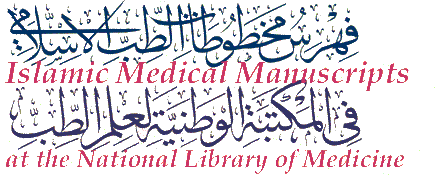Catalogue: Medical Monographs
 A Note on Biographical Dictionaries
A Note on Biographical Dictionaries
Medieval biographical dictionaries are among our most important sources for the lives and writings of early Islamic physicians, as well as accounts of early Greek physicians as they were known to medieval Arabic readers.
In the 9th century, Isḥāq ibn Ḥunayn composed a short history of physicians that is an important document for understanding the view that 9th-century physicians had of their predecessors in Antiquity (see Franz Rosenthal, "Ishaq b. Hunayn's Ta'rih al-atibba'", Oriens, vol. 7 (1954) pp 55-80; and F.W. Zimmermann, "The Chronology of Ishaq ibn Hunayn's Ta'rih al-atibba'", Arabica, vol. 21 (1974) pp. 325-330).
The most detailed biographical dictionaries were composed in the 12th and 13th centuries. They present summaries of the lives of physicians and other scholars, often illustrated with various anecdotes and poetry, along with lists of the treatises that they were known to have composed. For the lives and writings of early Islamic physicians, one of the most important Arabic biographical dictionaries was that compiled by a judge in Aleppo, Syria, al-Qifṭī, who died in 1248/646. His treatise, in the shortened form that is preserved today, covers 414 learned physicians, philosophers, and astronomers, and included non-Muslims as well as Muslims and Greeks, Indians, and Persians. NLM has a 17th-century copy (MS A 72). Ibn al-Qifṭī's treatise and that of his near contemporary Ibn Abī Usaybi‘ah (d. 1270/668) are the major sources for the lives of Egypt and Syrian physicians.
Late in the 13th century al-Shahrazūrī composed an Arabic biographical dictionary that focused upon Greek and early Islamic figures, presenting the lives of 34 pre-Islamic and 77 Islamic philsophers, scholars, and physicians. According to the copy now at NLM (MS P 17) it was translated into Persian in 1602 by Maqsud ‘Ali Tabrizi, who added a section on later Muslim philsophers. Other sources, however, state that the Persian translation was begun in 1605 at the request of the Mughal ruler Jahangir, who ruled from 1605-1627.
The alphabetical medical dictionary composed in 1518/924 by Muḥammad ibn Yūsuf al-Harawī also included entries for some physicians. It has, however, been catalogued separately under general medical dictionaries (MS A 6, item 1).
For medieval medical biographcal dictionaires in general, see Ullmann, Medizin, pp. 228-233; Sami Hamarneh, "Arabic Historiography as Related to the Health Professions in Medieval Islam", Sudhoffs Archiv, vol. 50 (1966), pp. 2-24; and Doris Behrens-Abouseif, "The Image of the Physician in Arab Biographies of the post-classical Age", in Der Islam, vol. 66 (1989), pp.331-343.










